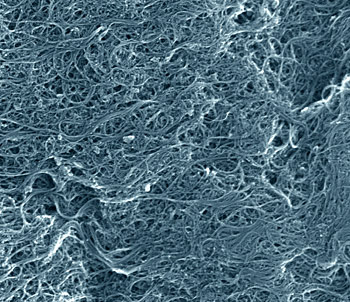A first-of-its-kind certified reference material has been released by the National Institute of Standards and Technology (NIST) for single-wall carbon nanotube soot, providing the valuable source of well-classified, homogenous carbon nanotube soot for scientists and companies to perform toxicity and chemical analysis and material comparisons.
 Scanning electron microscope image of a typical sample of the NIST single-wall carbon nanotube soot standard reference material. The nanotubes tend to stick together and form smaller and larger bundles. Some of the impurities also are visible. The image shows an area just over a micrometer wide (color added for clarity). (Credit: Vladar, NIST)
Scanning electron microscope image of a typical sample of the NIST single-wall carbon nanotube soot standard reference material. The nanotubes tend to stick together and form smaller and larger bundles. Some of the impurities also are visible. The image shows an area just over a micrometer wide (color added for clarity). (Credit: Vladar, NIST)
Single wall carbon nanotubes demonstrate novel functional properties thanks to their nano-size. However, it is difficult to manufacture these nanotubes on large scale or without substantial impurities. The normal production process of these tubes involves the use of tiny metal catalyst particles to accelerate their growth, resulting in a material containing significant impurities, including catalysts and other carbon forms.
According to Jeffery Fagan, a chemical engineer at NIST, the non-uniformity between different lots of single wall carbon nanotubes is one the major bottlenecks to perform comparison study and toxicity analysis. To overcome these problems, NIST’s multidisciplinary research team has involved in the development of a metrology for quantitative measurements of single-wall carbon nanotubes using a three prong method that includes documentary standards and protocols from international standards organizations, fundamental metrology and separation science, and the certified reference material.
The new product of NIST, Standard Reference Material (SRM) 2483 with a title ‘Single-Wall Carbon Nanotubes (Raw Soot),’ will directly tackle the comparability issues. It is probably the single largest source of chemically analyzed, homogeneous carbon nanotube soot in which the sample uniformity is assured between units that are glass vials consisting of 250 mm of soot.
NIST certifies every unit of SRM 2483 for the mass fraction values of various typical impurities such as samarium, molybdenum, lanthanum, gadolinium, europium, dysprosium, cobalt, chlorine, cerium and barium. The institute also provides reference values for seven more elements. It also offers more reference data for nanotube analysis such as Raman and thermal gravimetric data, and for scanning electron microscopy images, Raman scattering spectra, near-infrared fluorescence spectra and ultraviolet-visible-near-infrared absorbance spectra. These sets of data allow buyers to compare their results of the purchased materials against the values of NIST and against the values of suppliers or after processing.